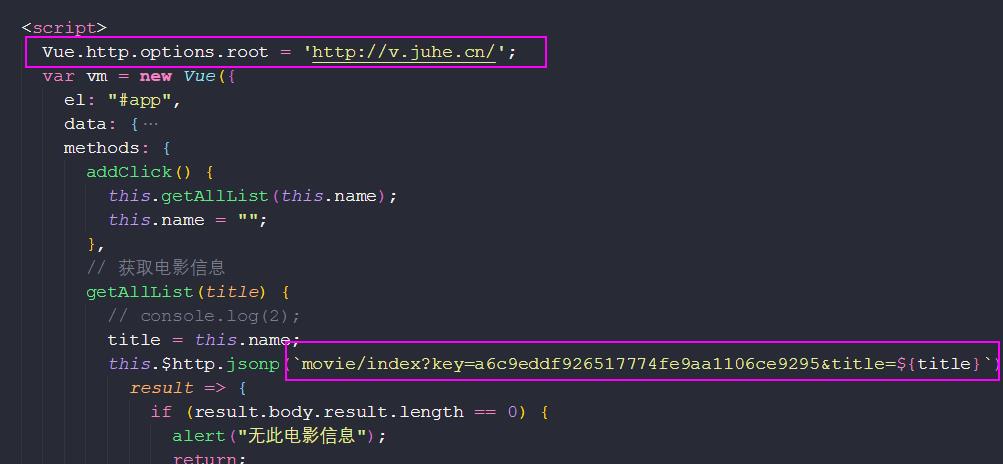大家好,这里是「 从零开始学 Web 系列教程 」,并在下列地址同步更新......
- github:https://github.com/Daotin/Web
- 微信公众号:Web前端之巅
- 博客园:http://www.cnblogs.com/lvonve/
- CSDN:https://blog.csdn.net/lvonve/
在这里我会从 Web 前端零基础开始,一步步学习 Web 相关的知识点,期间也会分享一些好玩的项目。现在就让我们一起进入 Web 前端学习的冒险之旅吧!

一、Vue发送Ajax请求
之前我们发送Ajax请求的方式,一是原生的方式发送,二是通过jQuery来发送Ajax请求。
但是我们知道,在Vue里面是不推荐使用jQuery的,那么如何使用Vue来发送Ajax请求呢?
在Vue中可以使用第三方插件vue-resource 来实现Ajax请求的发送。
1、vue-resource 安装
1、通过npm的方式在线安装:npm install vue-resource
2、在 github 中下载 vue-resource 的 文件 (在 dist 文件夹下有个 vue-resource.js 文件。)
3、使用 CDN。<script src="https://cdn.jsdelivr.net/npm/vue-resource@1.5.1"></script>
2、vue-resource 使用
参考链接:https://github.com/pagekit/vue-resource/blob/develop/docs/http.md
步骤:
1、在Vue.js之后引入vue-resource.js文件(因为vue-resource.js文件是依赖于Vue的)
2、全局使用:
then后面第一个参数是请求成功的回调函数;第二个参数是请求失败的回调函数。
获取到的结果在回调函数的参数中。
Vue.http.get(\'/someUrl\', [config]).then(successCallback, errorCallback);
Vue.http.post(\'/someUrl\', [body], [config]).then(successCallback, errorCallback);
Vue.http.jsonp(\'/someUrl\', [config]).then(successCallback, errorCallback);
3、局部使用:在methods的事件中,使用 this.$http.get/post/jsonp(); 的形式发起请求。
this.$http.get(\'/someUrl\', [config]).then(successCallback, errorCallback);
this.$http.post(\'/someUrl\', [body], [config]).then(successCallback, errorCallback);
this.$http.jsonp(\'/someUrl\', [config]).then(successCallback, errorCallback);
示例:通过三个按钮点击分别获取get,post,jsonp请求。
<!DOCTYPE html>
<html lang="en">
<head>
<meta charset="UTF-8">
<title>Document</title>
<script src="./lib/vue-2.4.0.js"></script>
<script src="./lib/vue-resource-1.3.4.js"></script>
</head>
<body>
<div id="box">
<input type="button" value="get请求" @click="getClick">
<input type="button" value="post请求" @click="postClick">
<input type="button" value="jsonp请求" @click="jsonpClick">
</div>
<script>
var vm = new Vue({
el: " #box ",
data: {},
methods: {
getClick() {
// 参数1:测试用的地址:http://vue.studyit.io/api/getlunbo
// 参数2:[config] 可选
this.$http.get("http://vue.studyit.io/api/getlunbo").then(result => {
console.log("ok");
console.log(result.body);
});
},
postClick() {
// 参数1:测试用的地址:http://vue.studyit.io/api/getlunbo
// 参数2:[data]数据,可为Object,FormData,String,这里为空
// 参数3:[config] 可选,但是emulateJSON = "true" 表名表单格式为:application/x-www-form-urlencoded,否则
// 可能有的浏览器不认识。
this.$http.post("http://vue.studyit.io/api/post", "", {
emulateJSON: true
}).then(result => {
console.log(result.body);
});
},
jsonpClick() {
this.$http.jsonp("http://vue.studyit.io/api/getlunbo").then(result => {
console.log(result.body);
});
}
}
});
</script>
</body>
</html>
注意:获取到的数据在成功回调函数参数data的中,data是个对象,具体需要的数据是 data.body。
二、vue-resource 跨域请求数据
1、jsonp的实现原理
jsonp主要是为了解决跨域请求问题的。
我们知道,由于浏览器的安全性限制,不允许AJAX访问 协议不同、域名不同、端口号不同的数据接口,浏览器认为这种访问不安全。
但是,script标签src属性中的链接却可以访问跨域的js脚本,于是利用这种特性,我们让服务器不再返回数据,而是返回一段调用某个函数的js代码,然后在script中进行调用,就实现了跨域。
示例:使用JSONP,添加了一个script标签,标签的src指向了另一个域 www.xxx.com下的 jsonp.js 脚本。
<!DOCTYPE html>
<html>
<head>
<title>title</title>
</head>
<body>
<script type="text/javascript">
function jsonphandle(data){
alert("age:" + data.age + "name:" + data.name);
}
</script>
<script type="text/javascript" src="jquery-1.8.3.min.js">
</script>
<script type="text/javascript" src="http://www.xxx.com/jsopn.js"></script>
</body>
</html>
要实现跨域,所以返回的 js 代码应该是一个函数的调用。www.xxx.com 下的 jsonp.js 代码如下:
jsonphandle({
"age" : 15,
"name": "John",
})
于是,结果就弹出对话框。
我们再改进一下,在script的src中传入的大多是后台文件,这里以php文件为例。
由于我们之前传入 js 文件只是想得到一个函数的调用而已,那么传入php文件怎么获取函数的调用呢?
<!DOCTYPE html>
<html>
<head>
<title>GoJSONP</title>
</head>
<body>
<script type="text/javascript">
function jsonphandle(data){
alert("age:" + data.age + "name:" + data.name);
}
</script>
<script type="text/javascript" src="jquery-1.8.3.min.js">
</script>
<script type="text/javascript">
$(document).ready(function(){
var url = "http://www.xxx.com/jsonp.php?id=1&callback=jsonphandle";
var obj = $(\'<script><\\/script>\');
obj.attr("src",url);
$("body").append(obj);
});
</script>
</body>
</html>
这里动态的添加了一个script标签,src指向跨域的一个php脚本,并且将上面的js函数名作为callback参数传入,那么我们看下PHP代码怎么写的:
<?php
$data = array(
\'age\' => 20,
\'name\' => \'张三\',
);
$callback = $_GET[\'callback\'];
echo $callback."(".json_encode($data).")";
return;
php代码返回的也是一个函数调用,我们需要的数据,就在其参数里面。成功弹出提示框:
jsonphandle({
"age" : 15,
"name": "张三",
})
最后,jQuery提供了方便使用jsonp的方式:
<!DOCTYPE html>
<html>
<head>
<title>GoJSONP</title>
</head>
<body>
<script type="text/javascript" src="jquery-1.8.3.min.js">
</script>
<script type="text/javascript">
$(document).ready(function(){
$.ajax({
type : "get",
async: false,
url : "http://www.xxx.com/jsonp.php?id=1",
dataType: "jsonp",
jsonp:"callback", //请求php的参数名
jsonpCallback: "jsonhandle",//要执行的回调函数
success : function(data) {
alert("age:" + data.age + "name:" + data.name);
}
});
});
</script>
</body>
</html>
其中参数 data,即为php代码返回的函数调用的参数,就是我们先要的数据。
参考链接:https://blog.csdn.net/u011897301/article/details/52679486
2、跨域获取电影信息
这里我使用 聚合数据:https://www.juhe.cn 的免费API。

使用方式很简单,注册之后,申请数据后,在个人中心->我的数据,接口名称上方查看key值。
而我们访问的url即为:http://v.juhe.cn/movie/index?key=您申请的key&title=头文字D
我们在name输入框中输入电影名称后,点击查询按钮即可显示相关信息。
<!DOCTYPE html>
<html lang="en">
<head>
<meta charset="UTF-8">
<meta name="viewport" content="width=device-width, initial-scale=1.0">
<meta http-equiv="X-UA-Compatible" content="ie=edge">
<title>Document</title>
<script src="./lib/vue-2.4.0.js"></script>
<script src="./lib/vue-resource-1.3.4.js"></script>
<style>
* {
padding: 0;
margin: 0;
position: relative;
}
/* 实现任意无宽高盒子居中 */
#app {
width: 100%;
position: absolute;
left: 50%;
/* top: 100px; */
transform: translateX(-50%);
}
.box {
width: 100%;
height: 40px;
background-color: #ccc;
display: inline-block;
text-align: center;
line-height: 40px;
border: 1px solid #aaa;
box-sizing: border-box;
border-bottom: none;
}
.box>input[type="button"] {
width: 60px;
background-color: #aaa;
border: 0;
border: 1px solid #aaa;
margin: 0 20px;
}
.tb {
width: 100%;
height: 100%;
text-align: center;
border-collapse: collapse;
border-color: #ccc;
}
.th {
background-color: rgb(24, 204, 204);
}
</style>
</head>
<body>
<div id="app">
<div class="box">
<label for="name">
电影名:
<input type="text" id="name" v-model="name">
</label>
<input type="button" value="查询" @click="addClick">
</div>
<table border="1" cellspacing="0" class="tb">
<thead class="th">
<tr>
<th>年份</th>
<th>标题</th>
<th>评分</th>
<th>类型</th>
<th>时长</th>
<th>主演</th>
<th>简介</th>
<th>删除</th>
</tr>
</thead>
<!-- 有查询的话,这里就不应该固定死,而是根据keywords动态生成新的数组 -->
<!-- <tr v-for="item in list"></tr> -->
<tbody>
<tr v-for="item in list">
<td>{{item.year}}</td>
<td>《{{item.title}}》</td>
<td>{{item.rating}}</td>
<td>{{item.genres}}</td>
<td>{{item.runtime}}</td>
<td>{{item.actors}}</td>
<td>{{item.plot_simple}}</td>
<td>
<!-- 绑定的事件是可以传参数的,这里传入需要删除的对象id -->
<a href="javascript:;" @click.prevent="delClick(item.id)">del</a>
</td>
</tr>
</tbody>
</table>
</div>
<script>
// 全局配置数据接口的根域名
//Vue.http.options.root = \'http://v.juhe.cn/\';
var vm = new Vue({
el: "#app",
data: {
name: "",
rating: "",
genres: "",
runtime: "",
title: "",
actors: "",
plot_simple: "",
year: "",
// 假数据
list: [{
\'rating\': 7.3,
\'genres\': \'动作/惊悚/科幻\',
\'runtime\': \'139分钟\',
"title": "哥斯拉",
"actors": "马修·布罗德里克",
"plot_simple": "一道亮光划过天际,太平洋上波涛汹涌",
"year": "1998",
},
{
\'rating\': 1,
\'genres\': 2,
\'runtime\': 3,
"title": 4,
"actors": 5,
"plot_simple": 6,
"year": 7,
}
]
},
methods: {
// 按钮点击事件处理函数
addClick() {
this.getAllList(this.name);
this.name = "";
},
// 获取电影信息
getAllList(title) {
// console.log(2);
title = this.name;
this.$http.get(`http://v.juhe.cn/movie/index?key=a6c9eddf926517774fe9aa1106ce9295&title=${title}`).then(
result => {
if (result.body.result.length == 0) {
alert("无此电影信息");
return;
}
this.list = result.body.result;
});
}
}
});
</script>
</body>
</html>
由于API要求我们访问的方式为 get请求,所以我们使用 this.$http.get 的方式来获取电影信息。
然后打印获取到的数据result,但是却爆出如下错误信息:

错误信息是表示,无法实现跨域。而我们之前知道 jsonp是可以实现跨域问题的。
于是我将get请求改为jsonp请求:this.$http.jsonp 就可以了。
改进:
之前直接把数据接口放在了请求地址里面,如果地址变了,就要在请求地址里面修改,如果不止一个还有其他post,get请求等,那么就要修改多次,所以我们有必要动态的指定数据接口。
使用:Vue.http.options.root = \'http://v.juhe.cn/\'; 来指定数据接口的根地址。
我们在请求的时候只需要写 movie/index?key=a6c9eddf926517774fe9aa1106ce9295&title=${title} 就可以了。

注意:后续地址,不要写 / ,否则就不会将根地址和后续地址进行拼接。
当然,对于我们发给服务器的数据,可能会需要 emulateJSON = true;
我们也可以进行全局配置:Vue.http.options.emulateJSON = true;
